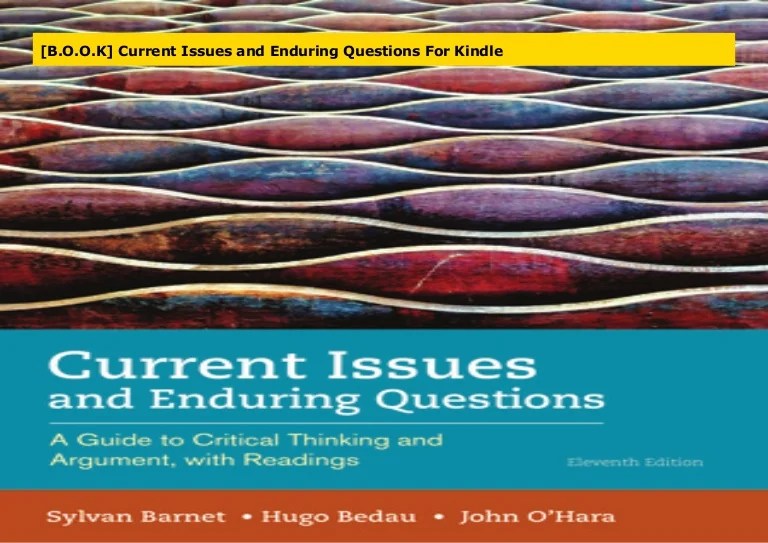Current issues and enduring questions 12th edition pdf – Current Issues and Enduring Questions, 12th Edition, PDF, presents a comprehensive analysis of pressing contemporary concerns and timeless philosophical inquiries. This authoritative text delves into the historical, cultural, and societal contexts that shape our understanding of these complex topics.
Through engaging case studies, the text examines the impact of globalization, technology, and social justice on current events. It challenges readers to think critically and develop informed perspectives on the enduring questions that have shaped human civilization.
Current Issues
Current issues refer to contemporary topics, events, and trends that have significant social, political, economic, or environmental implications. These issues are often characterized by their immediacy, relevance, and impact on society.
Examples of current issues include climate change, globalization, economic inequality, political polarization, and technological advancements. These issues have profound effects on individuals, communities, and nations, shaping our lives and influencing our future.
Historical and Cultural Contexts
Current issues are often rooted in historical and cultural contexts. Understanding the historical antecedents and cultural influences of these issues is crucial for developing informed perspectives and effective solutions.
For instance, the roots of climate change can be traced back to the Industrial Revolution and the burning of fossil fuels. Similarly, globalization has been shaped by technological advancements, political ideologies, and economic policies.
Enduring Questions

Enduring questions are fundamental inquiries that have perplexed humanity throughout history and across cultures. These questions grapple with the nature of existence, knowledge, morality, and the human condition.
Examples of enduring questions include: What is the meaning of life? How do we know what is right and wrong? What is the nature of reality? These questions have no definitive answers but have inspired countless philosophical, religious, and scientific explorations.
Relevance to Contemporary Society
Enduring questions remain relevant to contemporary society because they address universal human experiences and concerns. They challenge us to reflect on our values, beliefs, and assumptions.
For instance, the question of morality continues to be debated in the context of medical ethics, social justice, and environmental sustainability. The question of the nature of reality is explored in modern physics and cosmology.
Critical Thinking

Critical thinking is a set of cognitive skills that enable us to analyze information, evaluate arguments, and form informed judgments. It is essential for understanding current issues and enduring questions.
Critical thinking skills include:
- Identifying and analyzing assumptions
- Evaluating evidence and arguments
- Recognizing biases and fallacies
- Developing and defending reasoned conclusions
Challenges and Obstacles
Critical thinking in the modern world faces challenges, including:
- Information overload and the spread of misinformation
- Cognitive biases and emotional influences
- Polarization and echo chambers
Social Justice

Social justice refers to the fair and equitable distribution of resources, opportunities, and power in society. It encompasses issues such as economic equality, racial justice, gender equality, and disability rights.
Social justice movements have played a pivotal role in addressing current issues and enduring questions related to human rights, dignity, and well-being.
Role in Current Issues and Enduring Questions, Current issues and enduring questions 12th edition pdf
Social justice is integral to understanding and addressing current issues such as poverty, discrimination, and environmental degradation. It challenges us to confront systemic inequalities and work towards a more just and equitable society.
Social justice also sheds light on enduring questions about the nature of equality, fairness, and human rights.
Technology and Society
Technology has become an integral part of modern society, shaping our lives in countless ways. It has the potential to address current issues and advance human progress.
Examples of the impact of technology include:
- Improved communication and connectivity
- Enhanced access to information and education
- Advancements in healthcare and medicine
Ethical and Social Implications
While technology offers immense benefits, it also raises ethical and social concerns, including:
- Privacy and data security
- Job displacement and economic inequality
- Bias and discrimination in algorithms
Global Perspectives
Understanding global perspectives is essential for addressing current issues and enduring questions in an interconnected world. Different cultures and societies have unique perspectives and experiences that can enrich our understanding.
Examples of global perspectives include:
- Climate change from the perspective of developing countries
- Economic inequality in a globalized economy
- The impact of colonialism and imperialism on contemporary societies
Fostering Global Dialogue and Cooperation
Fostering global dialogue and cooperation is crucial for addressing transnational challenges and promoting mutual understanding. It involves:
- Promoting cross-cultural exchange and education
- Encouraging international collaboration and diplomacy
- Recognizing and respecting diversity
Historical Context

Understanding the historical context of current issues and enduring questions is essential for gaining perspective and informed analysis. Historical events and trends have shaped our present circumstances.
Examples of the importance of historical context include:
- The historical roots of racism and discrimination
- The impact of the Industrial Revolution on climate change
- The influence of past ideologies on contemporary political systems
Historical Analysis and Understanding
Historical analysis can provide insights into the causes, consequences, and patterns of current issues and enduring questions. It helps us identify similarities and differences between the past and present.
By examining historical context, we can gain a deeper understanding of the challenges and opportunities we face today.
Case Studies: Current Issues And Enduring Questions 12th Edition Pdf
Case studies are in-depth examinations of specific instances of current issues or enduring questions. They provide detailed accounts of the causes, consequences, and lessons learned from these cases.
Examples of case studies include:
- The case of Roe v. Wade and the right to abortion
- The case of the Holocaust and the dangers of totalitarianism
- The case of the environmental disaster at Bhopal, India
Implications for the Future
Case studies can provide valuable insights into how current issues and enduring questions have played out in specific contexts. They can help us identify patterns, draw lessons, and inform our understanding of similar issues in the future.
By examining case studies, we can better anticipate challenges and develop effective strategies for addressing them.
Expert Answers
What are the key concepts explored in Current Issues and Enduring Questions, 12th Edition?
The text examines concepts such as critical thinking, social justice, global perspectives, and the historical context of current issues and enduring questions.
How does the text analyze the impact of technology on society?
The text explores the ethical and social implications of technological advancements and discusses how technology can be harnessed to address social problems.
What is the significance of understanding global perspectives in the context of current issues?
The text emphasizes the importance of considering diverse viewpoints and fostering global dialogue to develop a more comprehensive understanding of complex issues.